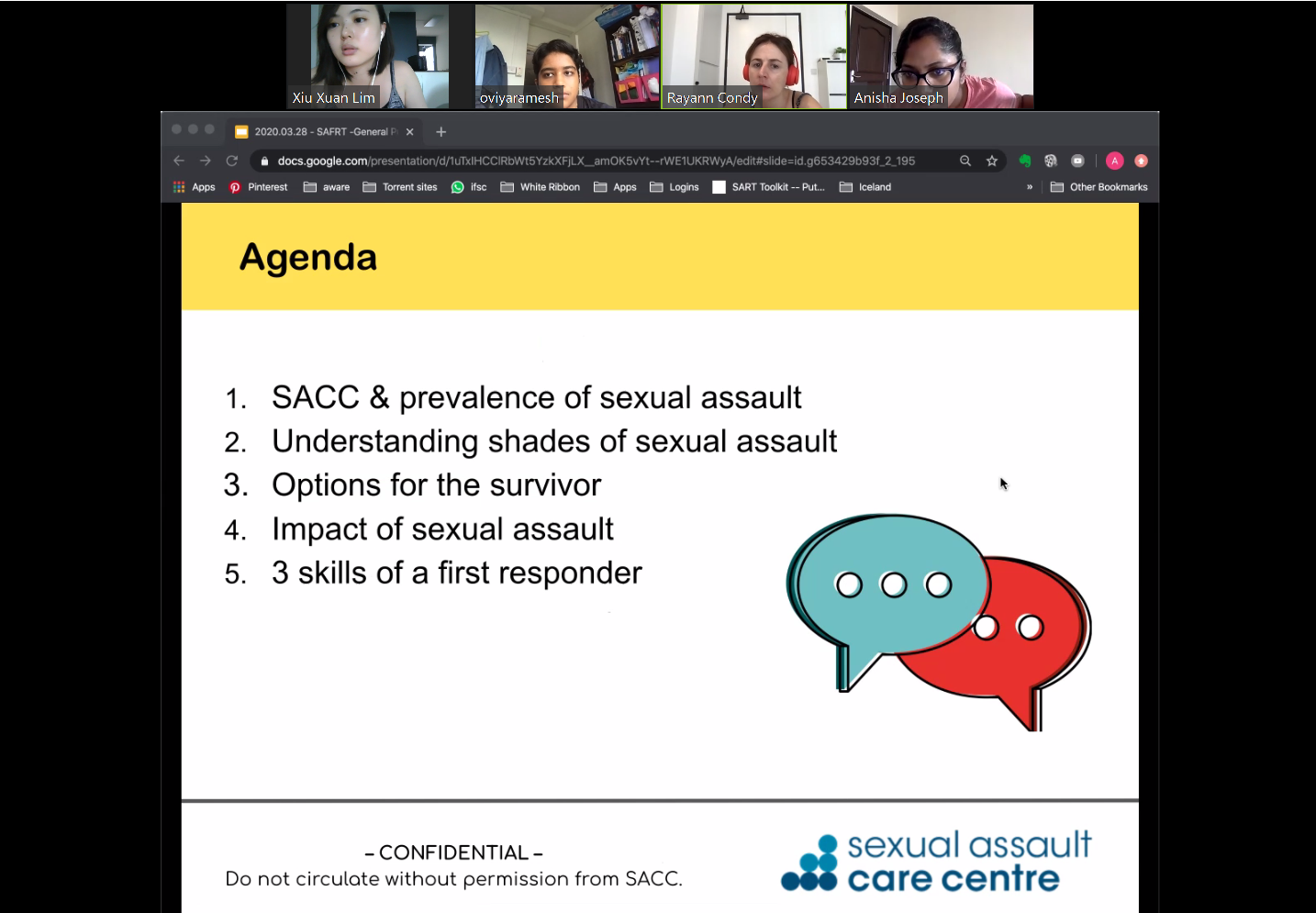-
Advocacy Theme
-
Tags
- Abortion
- Adoption
- Caregiving
- CEDAW
- Disability
- Domestic Violence
- Domestic Workers
- Harassment
- Healthcare
- Housing
- International/Regional Work
- Maintenance
- Media
- Migrant Spouses
- Migrant Workers
- Muslim Law
- National budget
- Parental Leave
- Parenthood
- Polygamy
- Population
- Race and religion
- Sexual Violence
- Sexuality Education
- Single Parents
- Social Support
- Sterilisation
- Women's Charter
A Recap: the first Zoom edition of Sexual Assault First Responder Training
April 23rd, 2020 | Gender-based Violence, News, Sexual and Reproductive Health
Written by Nur Atiqah Mohamad
On Saturday, 28 March 2020, AWARE’s Sexual Assault Care Centre (SACC) organised the first-ever online session of its Sexual Assault First Responder Training, in light of the COVID-19 outbreak in Singapore.
Make that first and second. SACC held two online sessions that Saturday—apart from the regular SAFRT training, a special youth edition took place in the afternoon, with a focus on campus sexual violence. Both sessions were attended by about 50 participants each, and led by SACC staff Anisha Joseph and Lim Xiu Xuan.
Sexual assault, explained Anisha and Xiu Xuan during the sessions, is an action centred on power and control. While survivors are disproportionately women, sexual assault can happen to anyone regardless of gender, age and background. Dominant societal myths about sexual assault reinforce unfortunate misconceptions: e.g. that survivors are responsible for the abuse they experience. All too often, this leads them to cope with their trauma in silence.
Hence, sensitive first response is necessary for survivors’ healing processes, to ensure they reach out for the help they need. The goal of SAFRT is for participants to learn about consent, Singapore’s legal framework around sexual assault, trauma reactions and key skills of a first responder.
Perhaps unsurprisingly, a few technical difficulties occurred at the beginning of the first session, but these were quickly resolved. Though it was their first time delivering SAFRT on Zoom, the trainers were very effective, utilising Zoom’s screen-sharing function to present their slides and show videos. For Q&As, participants could post their questions in the chat box, or use the “raise your hand” function and take turns to clarify their doubts verbally. They were even able to take part in smaller discussions amongst themselves, by being split into groups of 5-10 (via Zoom’s breakout room function). Many switched on their cameras so that they could see each other’s faces and communicate better.
The training started with a presentation of statistics about the prevalence of sexual assault in Singapore. In a survey by AWARE’s WeCan! initiative, more than 1 in three youth reported experiencing sexual violence. In late 2017, the number of people reaching out to SACC accelerated as a result of the #MeToo movement. While it is encouraging that more survivors are seeking help overall, Xiu Xuan and Anisha stressed that sexual violence is still very much underreported.
Participants were then shown a video about workplace sexual harassment, after which they engaged in a robust conversation about consent. Divided into two opposing positions, they had to justify why a particular act in the video constituted sexual harassment, or why it did not. The discussion revealed several societal expectations and norms that influence our views of what constitutes harassment.
Next, the trainers held a poll for participants to answer: Imagine you are crossing the road. Suddenly, a car comes towards you at high speed. What would be your reaction? Most participants’ responses varied between fight, flight and freeze.
Similarly, explained the trainers, survivors react in varied ways to assault. They also express a range of emotional or behavioral reactions—or sometimes none at all. There is no “one way” to be a survivor. However, widespread misunderstanding about how a survivor would “normally” behave can lead to a lack of patience from bystanders, and hence an insensitive response.
Hence, in first response there is nothing more important than empathy, active listening and the physical and psychological safety of survivors. A first responder ought to provide options and choices for the survivor, such as seeking support from counselling centres, taking legal action and informing authorities or external bodies.
Responding to a survivor’s disclosure can be tough. As a conclusion to the training, Xiu Xuan and Anisha shared four essential statements to remember as a first responder: “It’s not your fault”, “It’s your choice how to move forward”, “It’s your experience”, and “I’m here to support you”.
So concluded both of the four-and-a-half hour sessions that day. In fact, despite the long running time, participants were so passionate about the topics discussed that they suggested, in feedback, that even more time be given for discussions!
SACC’s next virtual Sexual Assault First Responder Training takes place Wednesday, 29 April, 3-8.30pm. Sign up now, or look out for future editions on our Eventbrite.




